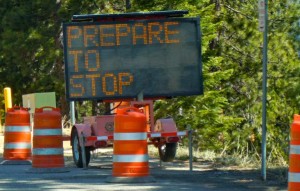Douglas County trying to come up with millions of dollars to repair dilapidated roads
By Anne Knowles
MINDEN – Douglas County is looking for money to repair its crumbling roads.
After years of underfunding road maintenance, and reallocating about $1 million from the current fiscal year’s general fund for repairs, the county now wants a permanent fix to an old problem.
This week the county had two public workshops, in Topaz and Minden, to present possible options for raising at least an additional $4 million annually in order to maintain 171 miles of paved roads. An annual budget of $7.7 million, the county estimates, would also eliminate the county’s $50 million road maintenance backlog in 10 years.

This sign would be common if Douglas County could find a way to pay for road improvements. Photo/LTN file
A Road Funding Task Force, comprised of about 20 residents created to investigate funding options, has met five times since June and will meet again next month before presenting its recommendations to County Manager Steve Mokrohisky, who will present them to the Board of Commissioners sometime in early 2014.
In the meantime, the county is seeking public input on the issue in an effort to find a solution that sticks and isn’t rejected by residents the way a bump in the gas tax has been in the past. In 1994, voters repealed a 5 cent jump in the tax implemented by the Board of Commissioners the year before. Ten years later, voters denied the 5 cent increase again, that time via a 2004 ballot measure.
“One of our concerns is the board doesn’t want to implement a gas tax only to have the voters repeal it,” said Mokrohisky at the workshop here on Nov. 20.
Residents of the county in Lake Tahoe may not be as aware of or as affected by rickety roads as other county residents. Eight general improvement districts there take care of most local road maintenance and the Nevada Department of Transportation is responsible for the state highways in the area. The county provides signal maintenance and maintains just 2.5 miles of roads, including Lake Parkway, according to the county.
But Lake Tahoe residents may end up paying more in fees or taxes, depending on the mechanisms chosen by the Board of Commissioners to raise the needed cash.
No single option presented at the workshops generates all of the needed funds, so the county will likely settle on a mix of solutions.
“There is no silver bullet,” Mokrohisky said. “One option is not going to fix the problem.
The county manager discussed six possible avenues for additional funds:
• More money could be shifted to road maintenance from the county’s general fund, the amount of which would be determined by the public’s tolerance for a corresponding reduction in other services.
• New road GIDs could be created to pay for local roads within each GID. About 60 percent of the county’s maintained roads are local roads in unincorporated areas such as the Johnson Lane area. The other 40 percent are so-called collector roads that are heavily trafficked such as Johnson Lane and Buckeye Road. Town residents, such as those in Minden and Gardnerville, pay a higher property tax than residents in the unincorporated areas to pay for local road maintenance. Property taxes for those residents in the unincorporated areas, which are below the state cap, could be raised to pay for maintenance of their local roads. The amount of money raised is still to be determined.
• A 1 percent increase in the utility operator fee on gas and electricity would raise about $800,000 annually. By law, the county could push up the fee by as much as 2.5 percent.
• The gas tax, by law, could be increased by as much as 5 cents. A jump of 5 cents would generate $900,000 annually.
• An infrastructure tax would be a 0.25 percent sales tax to produce $1.5 million every year.
• A public Transit and Road Maintenance Tax, which would have to be voted on, could bring in $3 million yearly.
The county may post an online survey on the topic. Details on the issue may be found at the county website. Mokrohisky said the workshop presentation would be made available there along with other documents and anyone interested in commenting may email or call his office.